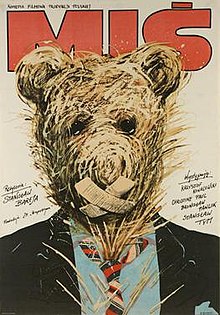Teddy Bear (1981 film)
| Miś (Teddy Bear) | |
|---|---|
 Poster for Miś | |
| Directed by | Stanisław Bareja |
| Written by | Stanisław Tym Stanisław Bareja |
| Starring | Stanisław Tym Barbara Burska Christine Paul-Podlasky |
| Cinematography | Zdzisław Kaczmarek |
| Music by | Jerzy Derfel |
Production company | Zespol Filmowy "Perspektywa" |
Release date | 1981 |
Running time | 111 minutes |
| Country | Poland |
| Languages | Polish English |

Teddy Bear is the English title of Miś [miɕ], a 1981 Polish comedy film directed by Stanisław Bareja. Teddy Bear, along with The Cruise (Rejs), was a reflection of contemporary Polish society using surreal humor to somehow get past the censorship at the time. It gained cult status in its native country.[1][2][3] Later, the film was reappraised by critics and it has been regarded as one of the best Polish films ever made.
Plot[edit]
Rysiek (Stanisław Tym, who also co-wrote the screenplay), the shrewd manager of a state-sponsored sports club, has to travel to London before his ex-wife Irena (Barbara Burska) gets there to collect a large sum of money from their joint savings account.
However, getting out of a communist country is never easy, even for a well-connected operator like Rysiek. After his wife destroys Rysiek's hard to get passport he is stranded in Warsaw while she's off to London. The circumstances force him to plot a Byzantine scheme with support of his equally cunning friend. Their plan involves a movie production as well as tracking down a look-alike (also played by Tym) to "borrow" their passport.
Hilarity ensues as Bareja gives the audience a guided tour of the corruption, absurd bureaucracy, pervasive bribery and flourishing black market that pervaded socialism in the People's Republic of Poland.
The titular (teddy) bear is a nickname given to the main character, but also a big straw-bear used in a corruption scheme. Perhaps playing on the well-established Russian Bear trope, Misha is the mascot of the 1980 Moscow Olympic Games, the same year as the film.
Cast[edit]
- Stanisław Tym as Ryszard Ochódzki and Stanisław Paluch
- Barbara Burska as Irena Ochódzka
- Krystyna Podleska (Christine Paul-Podlasky) as Aleksandra Kozel
- Krzysztof Kowalewski as Jan Hochwander
- Bronisław Pawlik as Stuwała
- Ewa Bem as herself
- Zofia Czerwińska as Irena Siwna
- Stanisław Mikulski as "Captain Ryś" a.k.a. "Wujek Dobra Rada" ("Uncle Good-Advice")
- Wojciech Pokora as Włodarczyk
- Eugeniusz Priwieziencew as a militiaman
- Hanna Skarżanka
- Kent Washington as basketball player
See also[edit]
Sources[edit]
- ^ Draniewicz, Anna B. (2011). Cut off by the 'Iron Curtain' (PDF) (MPhil). University of Bradford. hdl:10454/4927.
- ^ Abelis, Ona (17 April 2015). "15 Eastern European Cult Classic Films You Should Know About". Flavorwire. Archived from the original on 21 April 2015.
- ^ Haltof, Marek (2015). Historical Dictionary of Polish Cinema (2nd ed.). Rowman & Littlefield. p. 4. ISBN 978-1-4422-4472-6.
